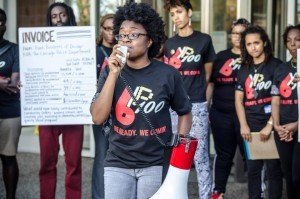An Interview with Charlene Carruthers, Black Rights Activist and Director of BYP100

As over 100 human rights defenders gather at Dublin castle this week for the annual Front Line Defenders Dublin platform, we at Babylon Radio interviewed one of the attendees – prominent black rights activist, Charlene Carruthers.
Charlene Carruthers has been a champion of black rights and justice for over 10 years, with experience in racial justice, feminist and youth leadership, and development. She presently serves as the national director of the Black youth project 100 (BYP100), an American activist organisation made up of Black 18-35 year olds. BYP100’s aim is to create justice and freedom for all black people, through advocacy, education and cultural expression.
Charlene sat down with us to tell us more about her experience as a black rights activist, BYP 100’s activities, and the struggles the black community face in America.
The struggle for black rights has been historically ingrained in the United States. Was there a particular event though which inspired you to become a strong advocate for black rights and justice?
C: I grew up in Chicago, which is one of the largest cities in the United States. It is also, however, a site of deep rooted segregation and economic injustice for black people. I was always conscious of something wrong while growing up in Chicago, and was always aware of how power was being used. I guess this prompted me to fight for black people to live with full dignity as full human beings.
You currently serve as director for BYP100. Tell us more about the organisation, what kind of activities are you involved in?
C: BYP100 organises black activists across the United States, and our work is rooted in the singular goal of black liberation. We recognise that all black people have a part to play in this process, be they workers, community organisers, or policy advocates.
We are involved in many activities. Just last week we staged an action against the annual conference held by the Interational association of chiefs of police. Over 14000 law enforcement officers were there, and we staged a protest to close down the conference. This involved replacing the American flag with a flag that said ‘Unapologetically Black’. We also brought coffins with the names of black people that had been killed by police or died in police custody, such as Sandra Bland and Rekia Boyd.
Race relations have been back in the the spotlight over the last 18 months, due to the murder and harassment of black persons by police officers. Has this seen a rise in people joining BYP100?
C: Yes. Black people have always been oppressed by the American government, but what we are witnessing now is a heightened awareness of the police killings and harassment. People want to do something about it.
In truth it’s not just about the police, but rather a broader institutional issue. For example, dozens of public schools in black communities are being closed down. Over 50 schools were closed down in Chicago in one year; in Philadelphia over 12 were closed in one year. People are connecting the fact that we are funding policing and defunding schools.
Does your organisation network with other black right’s advocacy groups across the United States?
C: We’re connected to a number of organisations that advocate for black rights across America. Some groups we are involved with include ‘we charge genocide’, the Malcolm X grass roots movement, and the black lives matter network. We do community organising and build relationships with each other to move our agendas forward.
How have law enforcement and surveillance groups intervened or prevented your organisation from doing its work?
C: They monitor our social media accounts for everything we do, meaning that often they show up to our events before us. We know that they monitor our organisation and what we do online.
Social media is a powerful tool in which to mobilise activism, but you have also been targeted negatively on it. Tell us about this experience.
C: I have been subject to attack on social media, be it on twitter or facebook. One example was during a trip I made to Palestine last year. Our organisation was in Palestine to build a relationship with Palestinian activists, and I received a lot of vitriol on both twitter and facebook. People were questioning me as to why I was there, saying I was anti-Israel and against the Zionist movement.
Aside from that I have been subjected to both racist and sexist comments across social media.
As a human rights defender, what has been your proudest moment so far?
C: My proudest moment is actually seeing young people grow into being amazing leaders. People come in to the organisation, not knowing anything about organising and activism. To see them blossoming into strong leaders makes me incredibly proud.
The Dublin Platform is a great opportunity to meet like-minded people striving for similar goals. What do you hope to gain from this event?
C: My biggest hope is to learn the stories from people that I have only read about so far. To meet them, talk to them, and learn from them. Also to figure out how we can best connect our work in the United States to the work that is happening all around the world.
For more information on the work of BYP100, visit their website at: http://byp100.org/
The Front Line Defenders Dublin Platform concludes with its final day tomorrow, November 6th. For more information, visit: https://www.frontlinedefenders.org/platform